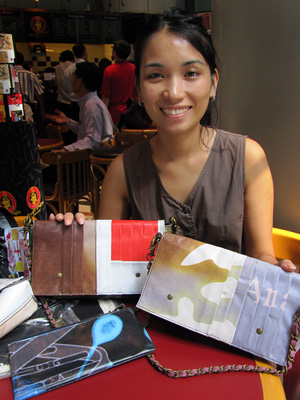Focus
Style cut from a different cloth
(China Daily)
Updated: 2010-09-02 13:53
 |
Large Medium Small |
Editor's note: Sue Wong Ming-wai, 27, is a Hong Kong designer and co-founder of
Deja Vu Creation, which makes products from old banners.
I got the idea walking through the University of Hong Kong. Every year, student clubs make banners, which are still new when they're dumped. With eight universities, each with more than 100 clubs, that's a lot of banners.
|
 Sue Wong Ming-wai shows bags made from recycled banners. Edmond Tang / China Daily
|
I decided to use them to make eco-friendly products but I quickly found out they are not so easy to find.
Advertising companies either think my company is too small or refuse to give us banners for copyright reasons. How could Chanel allow its logo to appear on our bags? Some schools and community centers have been supportive, though, and are happy to let us deal with the waste. Their banners are pretty new and much cleaner than the ones on the streets.
Some of the banners still have markings, which show where they come from or show a particular attitude. People love that.
I study every sheet to pick out the best bits and decide whether it should be used for one big bag or several smaller ones. Also, to get the best appearance and feel, the material is folded in different ways for each product. It's always surprising to see what comes out.
I work with a factory in Shenzhen in Guangdong province. The company is sophisticated at making leather bags but banners are new to them. Even the glue is difficult.
Both of us are exploring and, although research and development is slow, we're determined to make the best bags so they last longer. I bet no one handles banners better than us.
The bags are complicated to make but I'm trying to keep my prices low. My banner pencil cases cost HK$49 ($6). We pay the factory HK$10 per pencil case and HK$40 for a purse but the overall costs stretch to far more. My partner and I can only carry 50 banners every time we go to the factory, which is in a remote area of Shenzhen.
The travel costs are about HK$100 each and we have to keep going back to make sure the tailors are making the right thing. It's not efficient, so we're not making very good money.
This may not be the most profitable business but it's worthwhile. I think more people should get a chance to try eco-friendly products. Hong Kong youngsters get the green concept but everything that is green is usually so expensive.
In August we launched an online store on Facebook. It's only been running a few weeks but sales are pretty good. Maintaining it is a lot of work, though; too much for me.
I'm thinking of splitting the products into two collections: one quick, simple and inexpensive, the other intricate designs that are a little bit pricier.
Sue Wong Ming-wai was talking to Emma Dai.